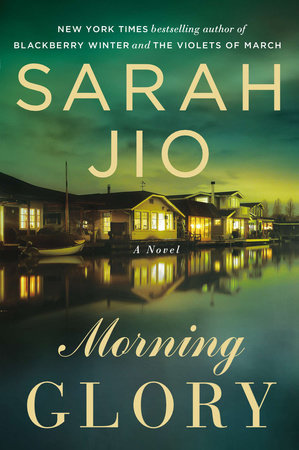Morning Glory Reader’s Guide
By Sarah Jio


INTRODUCTION
New York Times bestselling author Sarah Jio imagines life on Boat Street, a floating community on Seattle’s Lake Union’s home to people of artistic spirit who for decades protect the dark secret of one startling night in 1959.
Fleeing an East Coast life marred by tragedy, Ada Santorini takes up residence on houseboat number seven on Boat Street. She discovers a trunk left behind by Penny Wentworth, a young newlywed who lived on the boat half a century earlier. Ada longs to know her predecessor s fate, but little suspects that Penny s mysterious past and her own clouded future are destined to converge.
Sarah Jio is a frequent contributor to major magazines, including Real Simple, Glamour, Cooking Light, and Redbook, and is also the health and fitness blogger for Glamour.com. She lives in Seattle with her family.
You mention in a note at the beginning that your research for this novel was a bit different — you actually rented a houseboat to use as your office while writing! Did delving so deeply into the characters’ experiences in this way change your writing process at all? Did it lend something special to the book in any way?
Yes, I was extremely fortunate to be able to rent a lovely little houseboat on Seattle’s Lake Union while writing this book. At first I worried it would be a frivolous splurge, but the experience ended up being integral to the writing of this story. For instance, I could have never known the intricacies of floating home life without that experience-from the way a houseboat sways gently on a windy day on the lake, to how mallard ducks waddle up to your door on a lazy Sunday morning. It all went into the book!
As a mother yourself, what was it like to write about a woman who loses her only daughter and husband in a terrible accident? Was it painful to imagine her experience in such detail? How does harnessing your own fears in your writing allow you to tell a richer story?
Writing about such loss as a mother is definitely hard (and I did it before in Blackberry Winter), but I find that as difficult as it is to do, what comes out on the page is very real and honest, because as a mother of three young boys myself, I can put myself into the shoes of my character and feel her pain. Recently, for the New York Times, I wrote about this concept of harnessing my own fears as a person to use in my writing. I think that when you can do it, it makes for gripping, authentic pages.
Several characters in Morning Glory have difficulty expressing their feelings to others, even to their loved ones. What made you want to grapple with these issues of honesty, openness, and intimacy?
What a great observation, and so true of my characters. And isn’t it also true of life and families-to varying degrees? I think to some degree, we all keep some secrets from the ones we love most (small or large), and I think while the reasons vary, we do it most often from fear of judgment or losing love or approval. In a perfect world, there would just be openness without that kind of fear. But the world is not perfect. So we, and my characters, do have to keep some things close to our hearts.
What are you working on now?
I’m working on my seventh novel with Penguin, one I’m tremendously excited about. It’s a bit different than any other story I’ve told-stay tuned for more!
Just for joining you’ll get personalized recommendations on your dashboard daily and features only for members.
Find Out More Join Now Sign In